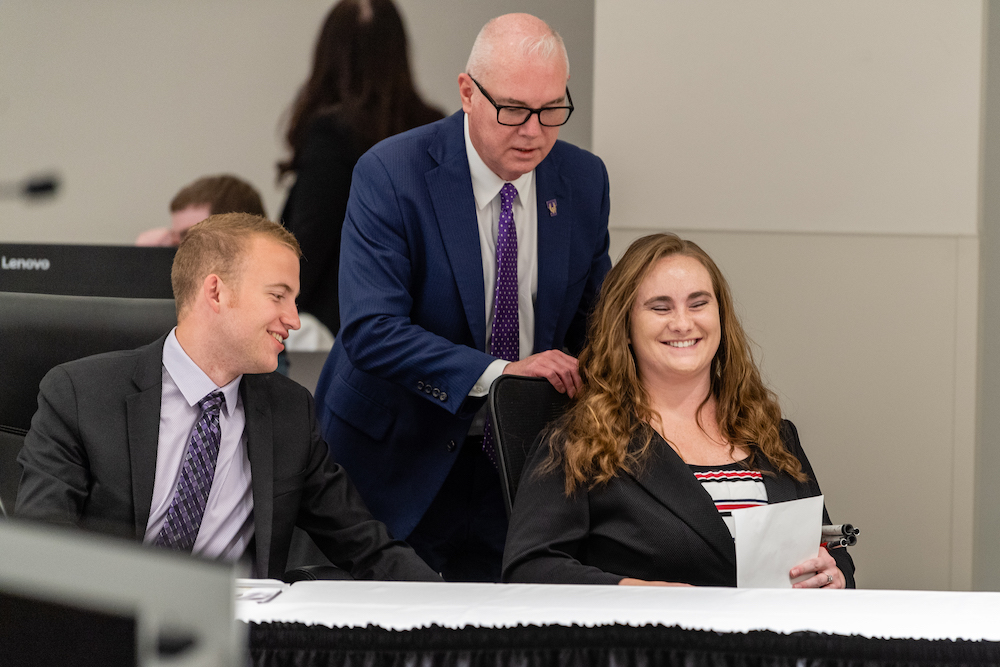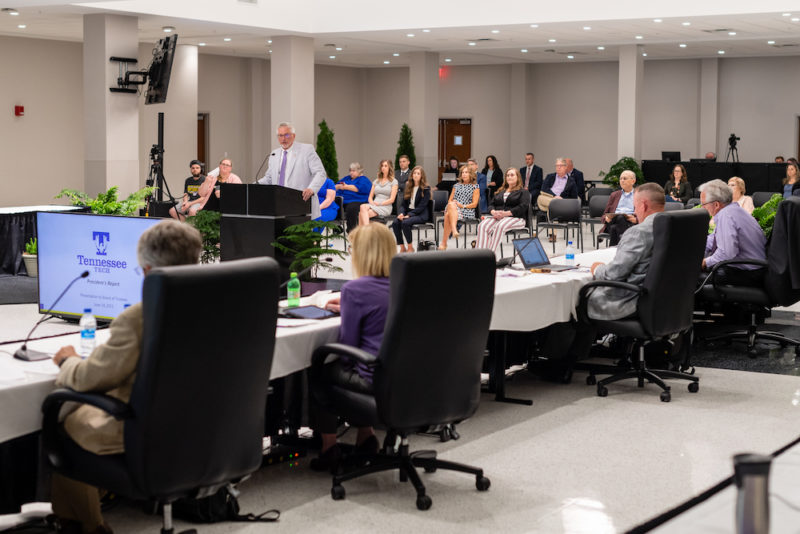
COOKEVILLE – Even though tuition and fees at Tennessee Tech will modestly increase for students during the upcoming academic year, most students will see their tuition and fees remain relatively flat, or for some even decrease, thanks to a significant reduction and restructuring of course-related academic fees.
“This change continues our push to make college costs as transparent and understandable as possible,” Tech President Phil Oldham said.
The Tennessee Tech Board of Trustees approved a 1.78% increase in tuition and mandatory fees as well as the elimination of academic course fees.
In prior years, for example, a student taking a laboratory course would have a $100 fee charged in addition to tuition. This caused a student’s cost of attendance to fluctuate each semester, making it difficult to budget in advance. Starting this fall, Tech students will no longer be charged such fees.
For some colleges – business, education, engineering and nursing – the academic course fees will become a per semester fee, based on their major and not individual courses. This will allow for a flat-rate fee to be collected each semester rather than a fee per course, enabling students to avoid a problem that has affected students in the past: the large jump in costs for their junior and senior years.
The elimination of academic course fees and the simplification of the way the major fees will be assessed are additional components of Tech’s initiative to make college costs as affordable and transparent as possible so students and families can better predict what college costs and better prepare.
Tech continues to be a leader in higher education to make college costs transparent and easier for students and families to understand.
Other parts of this simplified pricing initiative include a flat-rate tuition; a simplified mandatory fee structure; and the Tech Promise scholarship, a last-dollar scholarship that covers any outstanding tuition and mandatory fees not met by other scholarships or grants for eligible students. All of these were approved by the board over the last year.
“We continue to restructure fees to benefit students,” Oldham said. “With the board’s actions today, we have the most easily explained fee structure in the state.”
New Academic Programs
The board approved a letter of notification to the Tennessee Higher Education Commission regarding a new Ph.D. program in higher education. This letter is the first step of obtaining approval of the new doctoral degree.
The Higher Education Ph.D. will be the only such program in the state that will be fully online, and is the second Ph.D. program in the College of Education. It will focus on higher education access and persistence, with an emphasis on data analytics. As a Ph.D. program, it will have a strong research core.
The new program grew out of the university’s Tech Tomorrow strategic plan and will be aimed at prospective students desiring to work as faculty members, college administrators or as policy researchers.
The full review and approval process is expected to take two years, and once approved, students may start their coursework in fall 2023.
Over the last academic year, Tech added 11 new academic programs in colleges across campus, according to Provost Lori Mann Bruce. The new offerings include minors and concentrations.
“Academically, Tech is very dynamic,” Oldham said. “We continue to review and adjust our programs to make sure they are relevant to students.”
Diversity Efforts
Chief Diversity Officer Rob Owens announced that Tech has reached its $2 million goal for its endowed diversity scholarship initiative. Students receiving scholarships from these endowments will arrive on campus starting this fall.
According to Owens, these funds will “help us recruit high-level students of color to Tech.”
In other diversity efforts, Owens spoke about the establishment of the Diversity Champions program, where representatives from all colleges and major administrative units across Tech work in their units on diversity and inclusion issues.
In other business
- The board heard from Michelle Huddleston, assistant director of student affairs and head of Tech’s Service Learning Center, and two students, Marcus McMeans and Baylee Dalton, to discuss service learning at Tech. They shared their experiences in how Tech provides service through community engagement and course-related service learning. In 2019-2020, Tech students provided more than 90,000 hours of service to the community.
- H. Wayne Leimer, a professor of geology in the Department of Earth Sciences, was recognized for 50 years of service as a faculty member. He joined the university in 1971 and is retiring this year.
- Hannah Willis, a doctoral student in exceptional learning, was selected as the new student trustee, replacing Daniel Hines. Willis, from Cookeville, served as a senator in the Student Government Association from 2019-2021. She has served as president of Tech’s Educational Accessibility Mentors Club. She earned her undergraduate degree in psychology from Tech in 2018, and is the first female student trustee.
- The board approved tenure and promotion for 11 faculty members, and learned of promotion for an additional 15 faculty members.
- Trudy Harper was re-elected chair of the board for a two-year term. Teresa Vanhooser was also re-elected as vice chair for a two-year term.
- As part of his president’s report, Oldham reported that both externally funded research and private fundraising are expected to reach all-time highs, with both topping $22 million for the current fiscal year.
- The board approved two university capital projects for 2021-2022: the renovation of the public bathrooms in the Hooper Eblen Center ($500,000) and the upgrade the HVAC system in New Hall South ($880,000). Also approved was the next capital request to the state for 2022-2023: the renovation of Johnson Hall and demolition of Foster Hall ($20 million). This would be the first major renovation of the home of the College of Business since its construction in 1961. This renovation and demolition project is dependent on state funding.
Materials from today’s meeting and the webcast of the full board meeting are available at the board’s website, www.tntech.edu/board.
The board’s next meeting is Oct. 7, 2021.









